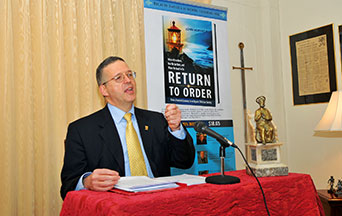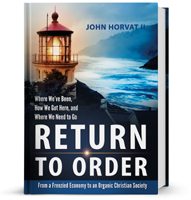
“Order is the first need of the soul” — Russell Kirk.
Given that the current crisis is principally economic in nature, an economic theme constitutes the main focus of this aptly named book. Without descending to the level of a technical treatise, John Horvat (see website here) offers an analysis of a philosophical, sociological and economic nature based on observations of economic developments in American and European history. Return to Order From a Frenzied Economy to an Organic Christian Society–Where We’ve Been, How We Got Here, and Where We Need to Go is the culmination of almost twenty years of extensive research.
Horvat’s main thesis centers on a great imbalance that has gradually entered the economy of the United States—and by extension, the Western world generally to a greater or lesser degree—for which he has coined the phrase “frenetic intemperance .” He defines this term as a reckless and restless spirit inside any modern economy, fomenting a drive to throw off legitimate restraints and gratify disordered passions.
The author makes a convincing case that the underlying problem is not specifically economic but rather moral and psychological, impacting modern society’s collective psyche. The current crisis has its roots in the most profound problems of the human soul. Thus, Horvat suggests that any lack of restraint in daily economic and commercial dealings will inevitably form an undercurrent operating in environments that neither include all large financial corporations nor exclude all small firms. Wealth is not the defining characteristic since such a restless spirit can exist equally in a small retail owner or a financial tycoon.
If this analysis is correct—and John Horvat provides plenty of historical evidence to back up his assertions—then any economic or financial solutions to the current crisis that do not primarily address such mental feverishness will be found wanting. From the consumer’s standpoint, this undercurrent’s influence can be felt in the prevailing tendency to live beyond our means and to borrow without regard for the future.
It would, however, be incorrect to interpret Horvat’s book as an attack on the capitalist system. Quite the reverse. The author robustly defends the market economy so long as it remains free of the pervasive mentality of what he terms “…. perpetual wheeling and dealing that turns businesses into pawns in a ruthless war to control markets, circumvent regulation and secure unfair advantages”.
Return to Order does not point in the direction of regurgitated socialist systems, ecological models or populist demagoguery for solutions to the current economic and financial crisis. These alternatives are based neither on natural law nor on objective reality. Indeed, far from resolving the present crisis, “….these new alternatives would fan the explosive expansion of human passions to greater intensity. The results of this new disordered world could be similar to the modern individualists who look to the masses to form their opinions”. The solution lies in a rich Christian heritage that preserves each country’s identity, unity and history while maintaining universal principles.
Horvat thus seeks an authentic return to order, namely towards an organic society corresponding to the natural development of man, free markets and society, devoid of frenetic intemperance. He strongly criticizes the modern obsession of viewing everything through the single prism of economics to the exclusion of all others. And here, the author unashamedly points to valuable lessons from the medieval economic order since, to the medieval mind, economics without ethics was ultimately self-destructive. Thus, the proposed model is a sketch based on principles rather than a comprehensive and pragmatic roadmap.
Order Here: Return to Order: From A Frenzied Economy to An Organic Christian Society
This in-depth study is radically at variance with the political correctness in today’s society. The four cardinal virtues of prudence, justice, fortitude and temperance are held up as providing necessary conditions for keeping things in balance. Such a conviction is both courageous and radical but based nonetheless on intuitive logic and good sense. As Horvat explains: “…. in vain do we seek to regenerate an economy if we do not regenerate the family, the community, and so many institutions that are its heart and soul. Indeed, to what purpose do we prosper if all this withers?”
The restoration of the traditional family with strong inter-generational ties and vocational traditions is proposed to combat undue reliance on predatory bank credit. The modification of present-day labor unions and professional bodies into associations of a providential nature, looking after both the spiritual and temporal needs of their members, constitutes a further example of the author’s thinking. And, in contrast to failing global consumption patterns and “…… the quantitative poverty of global mass production”, the temperance of a healthy local and regional self-sufficiency is lauded. These are but a few of the remedial themes that permeate John Horvat’s study. The proper roles of money and international trade within a balanced economy are also dealt with succinctly over the course of this work.
Return to Order is an elegantly written work that does not shy away from calling for a moral regeneration across Western civilization and the world as a necessary precondition for economic and social recovery. It will appeal to both the academic and the layman alike. John Horvat’s book not only provides a fascinating description of what a truly organic economy should conform to but displays a depth and quality of research and documentation in economics, economic and social history and sociology of the highest standards.
In the final analysis, economic reforms, financial policies or government programs that fail to rectify the underlying problems of imbalance and lack of proportion in modern economy may have a limited impact. This treatise calls for a long overdue restoration of social, cultural and moral values. Thus, the discussion and application of the broad principles Horvat enunciates to our concrete circumstances should prove both timely and rewarding.
Philip Beattie is a Senior Associate Academic of Insurance and Risk Management on the faculty of economics at the University of Malta. He is also the president of the Maltese Society for Christian Civilisation—Pro Malta Christiana.


